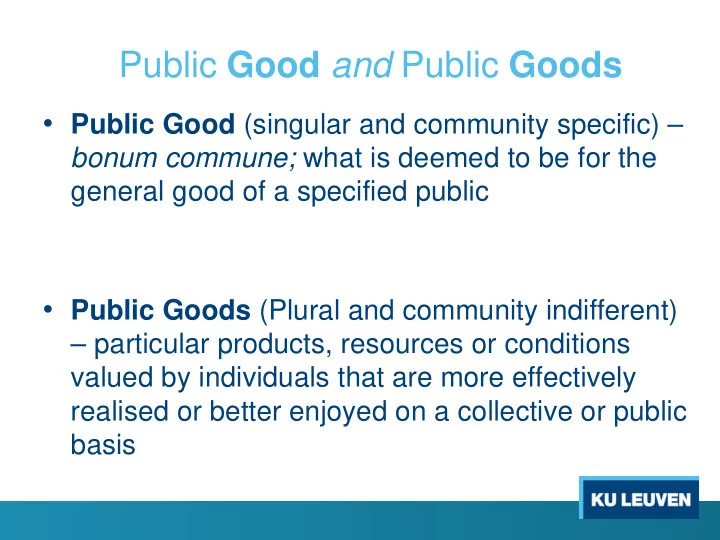

Public Good and Public Goods • Public Good (singular and community specific) – bonum commune; what is deemed to be for the general good of a specified public • Public Goods (Plural and community indifferent) – particular products, resources or conditions valued by individuals that are more effectively realised or better enjoyed on a collective or public basis
Two types of Political Association • Societas (nomocracy) Civil association based on acceptance of common rules as grounding an identifiable public (public GOOD) • Universitas (teleocracy ) Enterprise association based on co-operation to achieve some pre-specified collective purpose (public GOODS) However most actual political communities are a mixture of the two. The pursuit of each MAY encourage the other
The Public Good (societas) Thick or Thin • ‘thick’ – solidaristic sense of the public good as development of and commitment to a common ethical project – in line with communitarianism • thin’ –understood in welfarist terms as aggregate utility, or in broader tradition of modern liberalism as protection of individual autonomy ( also pre-modern sense of public Good, retained in modern natural law (Maritain, Finnis etc..,) – collective good here is reflection and realisation of common individual good, neither the aggregation and reconciliation of diverse individual interests as in liberalism/utilitarianism, nor construction of a shared ethic as in communitarianism)
Public Goods (Universitas) 1 Thin or Thick • “Thin’ – classical material public goods (and bads) – non-excludability of access and non-rivalry of consumption. (bridge, clean air, pandemic disease, climate change etc.,) • often matter of degree (and technological and normative choice) – both in creating public goods (e.g. free trade) and in constraining them by turning them into ‘club goods’ with restricted access • instrumental justification (for individual benefit) of the collective provision of the goods in question
Public Goods (Universitas) 2 Thin or Thick • Thick’ intrinsically social public goods – the good itself is a feature of social relations rather than a material product. • Makes essential reference to the ‘togetherness’ of our enjoyment- conviviality, friendship, tolerance, Rule of Law, common language, security – intrinsic justification of collective provision – produced by the group for the good of the group • Most such social Goods are mixed in their justification – both individual and collective rationale
Public Good(s) in the EU (compared to the state) • 1 . at best, ‘thin’ sense of the singular public Good (societas). Maximisation of individual utility in economic or interest-satisfaction terms – ordoliberalism and the economic constitution • 2. significant emphasis on instrumental Public Goods – from Monnet method and neo-functionalism to Ipsen’s ‘special purpose association’, Majone’s ‘regulatory state” and Scharpf’s ‘output legitimacy’ (carbon and steel production, common market , Euratom, CAP, currency, defence and foreign policy, macroeconomic stabilization, climate protection, energy production etc.) • 3. important secondary emphasis on social Public Goods ( of the mixed sort) – peace, prosperity, Rule of Law, toleration, cultural diversity etc.
Three Problems, three Challenges • Entrapment and policy gridlock – overemphasis on material public goods requiring normative innovation, precision and discipline (and so premium on Law). Problems of distributive fairness and competing national public goods – joint-decision trap • Policy fragmentation - Public goods increasingly diverse, not just natural ‘spillover’. Problems of coherence and joined-up legitimacy • Loose coupling between European society and European polity – social goods may have been more successful than often reckoned in making a European society (peace, prosperity, mutual tolerance, pride in constitutionalism) but these insufficient to create a solidaristic European public good. Gradualist analysis is flawed
Recommend
More recommend